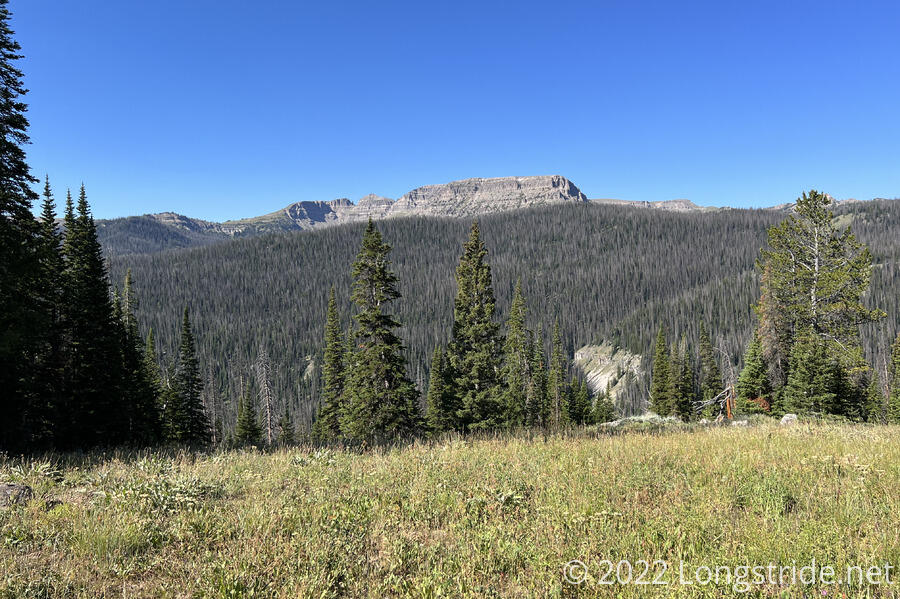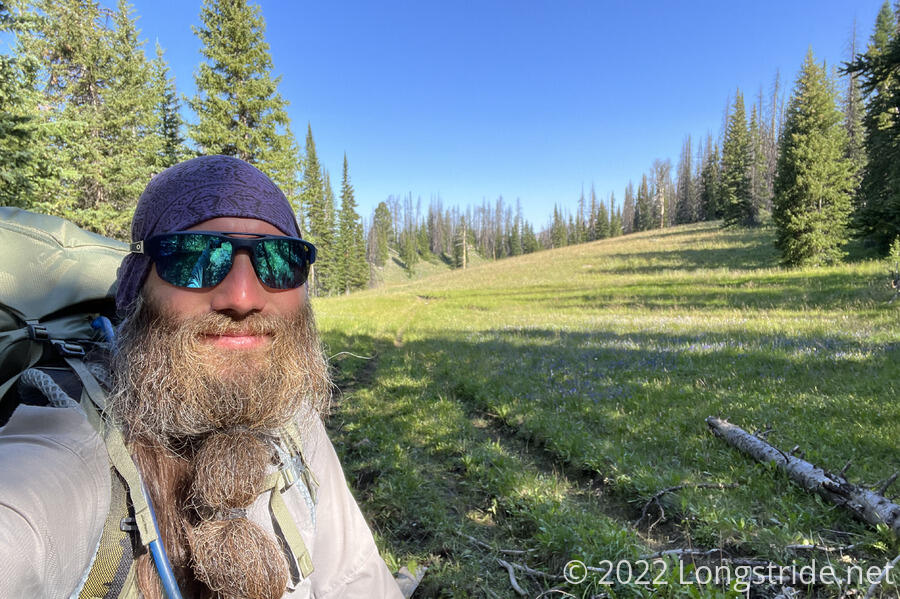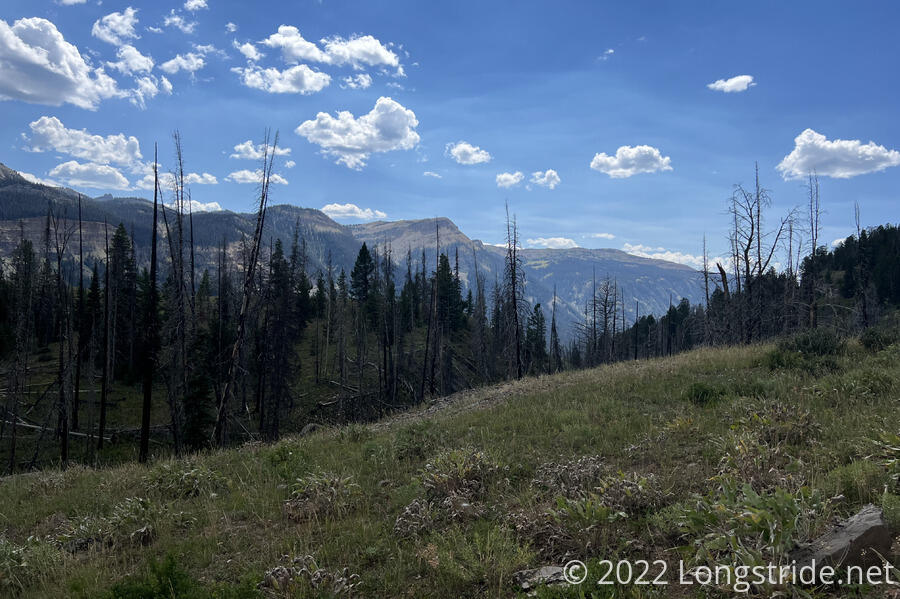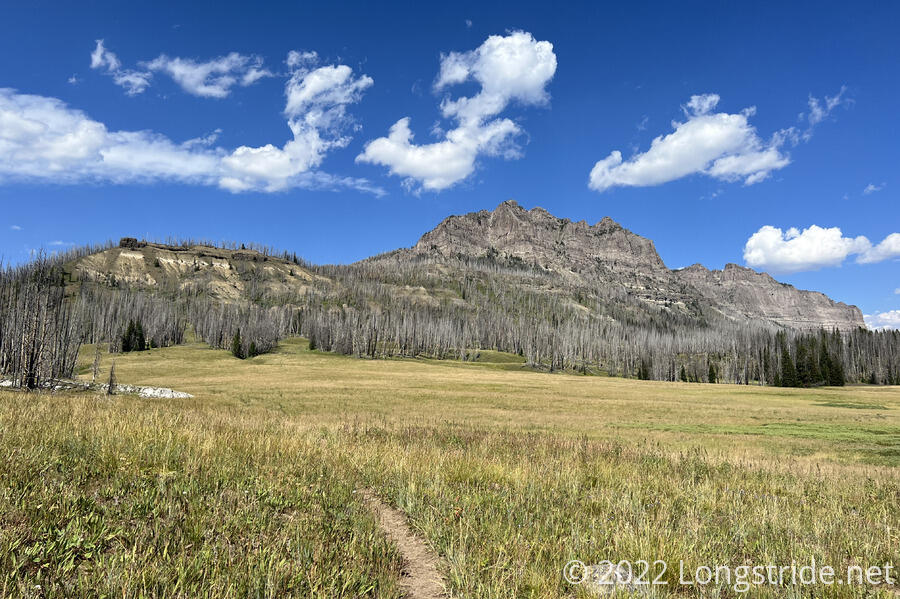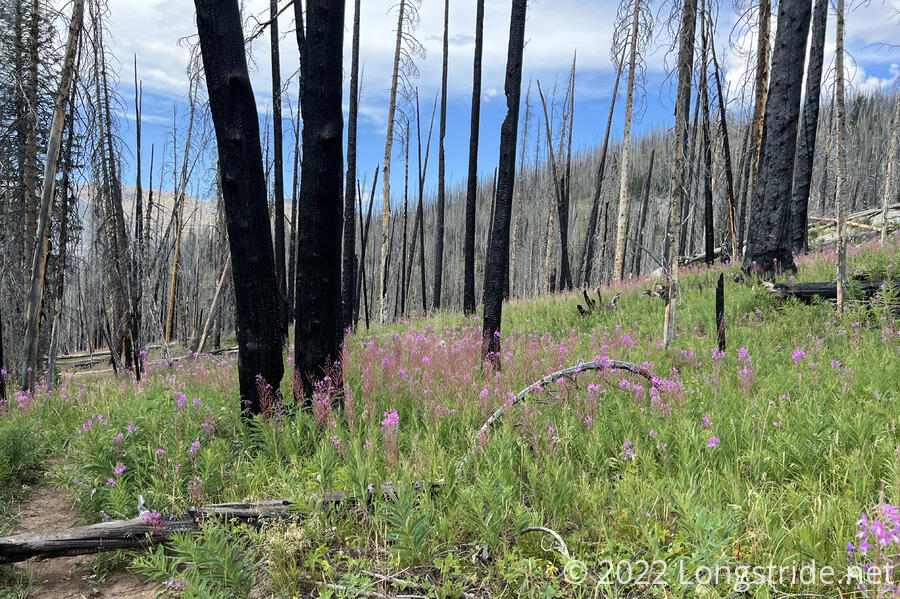Today was unusually tiring, and I didn’t hike very far, despite spending most of the day hiking.
I was pretty cold overnight, and despite an alarm set for 5:20 am, I didn’t even attempt to get up until 7 am. When I was drying the inside of my tent before packing it up, I found a little bit of ice — it must’ve fallen below freezing overnight. No wonder I felt cold.
Leaving my grassy campsite, I followed the trail downhill to Cub Creek. Unfortunately, there was a little too much water in the creek, and it was a little too wide, to be able to make it across dry. Comments in my trail guide suggested that there was a suitable log for crossing a tenth of a mile upstream. I attempted to find this log, however the trails leading in that direction were overgrown with willows, and it was slow to hike. Eventually, I decided I’d wasted more time trying to find my way to this log than it would’ve taken me to just take my boots off, put my crocs on, and cross at the trail crossing. So I went back to the trail crossing and did that.
The trail climbed up from the creek, somewhat steeply on the side of the mountain. My pack seemed to be doing a better job, but I was not.
I was fairly lethargic all day. Mostly, I think the issue is mental exhaustion from worrying about completing the trail in time. It’s making what I am hiking very not fun, even when the trail itself isn’t really that bad.
Once I got to the top of the hill from Cub Creek, I went through a long stretch of trail with grasshoppers everywhere, jumping every which way to get away from me.
I’d always assumed that grasshoppers were expert jumpers, given their name. As I passed more and more of them, it became clear that they’re really not. Rather, they’re good at jumping, but not so much aiming or landing. Less than half of them I saw actually landed on their feet; more likely, they landed on their sides, or upside down, or in some other less than useful position. And more than a few jumped directly at my legs. It seemed likely their jumping ability was less about being an effective means of travel, and more being just useful enough to distract predators.
Dropping down from the hill, I crossed Trail Creek (a recently repeated name; I crossed another one the last day of Colorado), and stopped for a break, only three miles into the day.
I continued downhill for a couple of miles, reaching the South Buffalo Fork. Apparently notorious for being very deep in the early season, it wasn’t terribly deep now, but it was far too deep to rock hop across. I again swapped to my crocs for crossing, and then stopped for a second break.
Climbing up from the creek involved some fairly wide switchbacks, and was a little less step than either of the morning’s two climbs. I passed a horseback rider with an extremely skittish horse heading downhill. Dark clouds passed by overhead, and it rained a little, as the trail passed through a burned area.
Later, I passed three southbounders, one of whom was collecting short videos from northbounders for his daughter’s birthday, since he couldn’t be there while hiking the trail. They also warned about a grizzly bear about ten miles north; he said he got charged from behind by a mother bear with two big cubs. More bears on the trail charging at hikers was, of course, the last thing I wanted to be worrying about.
I continued through a burn area on the trail, mentally exhausted. Now late afternoon, and hiking rather slowly all day, I decided to camp at a log cabin, adjacent to a meadow and relatively close to a creek that had bear boxes for food storage.
Shortly after I got to the cabin and started to set up, a Forest Service trail crew that had been working in the area —several volunteers and a ranger, with horses and a dog — arrived at the cabin to cook dinner, having already spread their tents in a wide area around the meadow.
We had a good chat over dinner. Their dog was entertaining to watch; it spent much of the evening chasing chipmunks up trees, and then waiting for them to come back down.
The dog and horses all had bells around their necks — not to scare off bears, but to assist in locating them if they wandered off — and the horses also had manacles on their front feet to keep them from wandering away. With the horses free to roam the meadow at night to graze, there was a perpetual quiet clanking as they wandered around.
Tomorrow: hopefully a longer day. I had a bit of slack in getting to Yellowstone, but two 12-mile days in a row have eaten into that. My overnight permit for Yellowstone requires me to be at my first campsite, 42 miles ahead, in two days.
